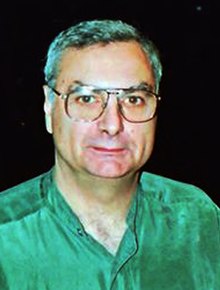Yair Rosenblum
Yair Rosenblum יאיר רוזנבלום | |
|---|---|
 | |
| Background information | |
| Born | January 6, 1944 Tel Aviv, Mandate of Palestine. |
| Origin | Tel Aviv, Israel. |
| Died | August 27, 1996 (aged 52) Holon, Israel |
| Genres | Israeli pop, Israeli rock. |
| Occupation(s) | Composer Arranger |
| Years active | 1962-1996 |
| Labels | Hed Arzi Music |
Yair Rosenblum (Hebrew: יאיר רוזנבלום; January 6, 1944 – August 27, 1996) was an Israeli composer and arranger.[1][2][3][4]
Music career
[edit]Rosenblum was born in Tel Aviv.[5] He was musical director of the Israel Defense Forces chorus in the 1960s and 1970s.[6] He directed Israel's annual music festivals.[5][6]
For the army and navy ensembles of the Israel Defense Forces, he oversaw conducting and wrote music. He is best known for such songs, including Shir LaShalom (1970).[7][8] He composed songs for films and television, and worked with a number of bands and choral groups, including primarily the IDF bands.[5][9][10][11] He wrote more than 1,000 songs, including "Ammunition Hill", "In a Red Dress," "The Beautiful Life," "Tranquility," "Hallelujah,""We must keep on singing" and "How should I bless him?."[6][12]
Death
[edit]Rosenblum died in Holon in 1996, at the age of 52, after a two-year battle with esophageal cancer.[6] After his death, his daughter Karen accepted the ACUM Prize for lifetime achievement on his behalf.[13]
References
[edit]- ^ Motti Regev; Edwin Seroussi (2004). Popular music and national culture in Israel. ISBN 9780520236547. Retrieved July 28, 2011.
- ^ Phillip Vannini; J. Patrick Williams (2009). Authenticity in culture, self, and society. ISBN 9780754675167. Retrieved July 28, 2011.
- ^ Marc Rosenstein (2010). Galilee diary. ISBN 9780807410783. Retrieved July 28, 2011.
- ^ "Yair Rosenblum". RadioHazak. June 11, 1995. Retrieved July 28, 2011.
- ^ a b c Marsha Bryan Edelman (2003). Discovering Jewish music. ISBN 9780827610279. Retrieved July 28, 2011.
- ^ a b c d Naomi Segal (August 30, 1996). "Composer of 'Peace Song' dies". Jweekly. Retrieved July 28, 2011.
- ^ Joel N. Eglash (2002). The Complete Jewish Songbook: The Definitive Collection of Jewish Songs. ISBN 9780807408216. Retrieved July 28, 2011.
- ^ Union of American Hebrew Congregations; National Federation of Temple Youth (1997). Shireinu = Shirenu : our songs : a songbook for camps, conclaves, kallot and retreats. New York: Transcontinental Music Publications. ISBN 0-8074-0622-8. OCLC 39133908.
- ^ Un'taneh Tokef; Lawrence A. Hoffman (2010). Who by fire, who by water-Un'taneh tokef. ISBN 9781580234245. Retrieved July 28, 2011.
- ^ Oliver Leaman (2001). Companion encyclopedia of Middle Eastern and North African film. ISBN 9780203426494. Retrieved July 28, 2011.
- ^ Amy Kronish; Costel Safirman (2003). Israeli film: a reference guide. ISBN 9780313321443. Retrieved July 28, 2011.
- ^ Gil Zohar (February 23, 2007). "Old soldiers never die". The Jerusalem Post. Archived from the original on November 7, 2012. Retrieved July 28, 2011.
- ^ Helen Kaye (January 23, 1997). "Songwriter Moshe Willensky dies at 87". The Jerusalem Post. Archived from the original on November 7, 2012. Retrieved July 28, 2011.
External links
[edit]
